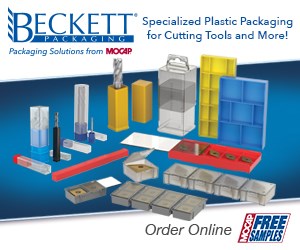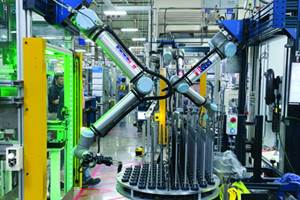4 Rules for Running a Successful Machine Shop
Take time to optimize your shop’s structure to effectively meet demand while causing the least amount of stress in the shop.
Share




Machine shops work in a very complex world these days, as the demands to get product to the customer on time and with the greatest quality is becoming more important every day. Many machine shops struggle to get jobs done on time for various reasons, so it is important to look at how you structure your shops to meet demand and cause the least amount of stress in the shop. Over the many years, I have come up with a number of rules and keys that I work with to help keep sanity in the shop. Here are four:
- Duplicate Equipment
When buying equipment, you need to start thinking about purchasing duplicate equipment. If you purchase one new piece of equipment, then you need to take into consideration eventually having a duplicate. This is important for many reasons. The first is that if you only have one machine that can do the job and it breaks down, you could use the duplicate to take up the slack. From my experience, when a machine breaks down, it always happens when you need it most. This has happened to me so many times that I have lost count. If you do not have a duplicate, then you must use an alternate machine that needs a different setup, which can sometimes create chaos on the shop floor.
Alternately, you may have to wait for your lone machine to be fixed. This can cause delays in delivery and may even result in costly quality mistakes being made. Mistakes in missed deliveries and quality will result in a very unhappy customer.
- Standardize Processes
I believe the key to quick changeovers in a job shop or other manufacturing facility is to have a standardized process. What I mean by this is using a base set of cutting tools to get most of the jobs done, and only using specialized tools when necessary. This enables faster programming and less swapping of tools when setting up.
Also key here is to standardize toolholding systems, which is particularly important with milling machines. Try to come up with a standard process — such as a dovetail, for example — so that the fixture can hold multiple different parts and not have to be set up every time. This makes setups faster and reduces the number of mistakes that can be made. Over the years, my experience has been that the less complex a setup is, the better it is. A simplified setup will lead to increases in quality as well as faster delivery.
Standardizing processes also presents an opportunity to better schedule jobs that flow through the shop, reducing the number of tooling and fixture changes when transitioning from job to job.
- Maintenance
I cannot emphasize enough that maintenance is a major key to success. Preventive maintenance is paramount to having a smoothly run shop. Scheduled maintenance helps ensure that customers get their parts when promised. Maintenance can be difficult when the shop is busy, but at least when it is on the schedule you can advise your customer more accurately on when parts will be delivered. Think of how many times a shop has been unable to deliver because of a breakdown due to poor (or lack of) maintenance practices.
The prior advice on duplicate machinery helps alleviate breakdowns, but many shops will take a while to have duplicate equipment when starting out. The only other way to minimize the impact of breakdowns is through ongoing prevent maintenance.
- Automation
Investing is automation that makes your machines more productive is an absolute key to being a successful machine shop today. I have seen many shops perish over the years because of their refusal to invest in automation of any kind. Normal shops that do not invest in automation must find a new employee every time they purchase a new CNC or manual machine. I know how difficult it is to find skilled people these days, and yet many shops still don’t buy automation and pursue skilled labor instead.
When things are busy, automation becomes even more critical. Automation is the key to productivity, quality and competitiveness. When a shop cannot compete, it is often because their competitor has automation and they do not. My suggestion is that if you have not started automating your shop, then start now. If you have started automating, then continue to do so as your shop grows.
These are just some of the basics to having a successful machine shop. There are many other rules and keys that will help, but these four can set a shop on its path toward being successful.
Related Content
4 Steps to a Cobot Culture: How Thyssenkrupp Bilstein Has Answered Staffing Shortages With Economical Automation
Safe, economical automation using collaborative robots can transform a manufacturing facility and overcome staffing shortfalls, but it takes additional investment and a systemized approach to automation in order to realize this change.
Read More6 Variations That Kill Productivity
The act of qualifying CNC programs is largely related to eliminating variations, which can be a daunting task when you consider how many things can change from one time a job is run to the next.
Read MoreHow to Optimize Operator Efficiency on Any Shop Floor
Striking the perfect balance of person to machine is unique to each shop and can depend on a number of factors, including the type of work a shop undertakes, the available equipment, staffing levels, scheduling and more.
Read MoreWhat are Harmonics in Milling?
Milling-force harmonics always exist. Understanding the source of milling harmonics and their relationship to vibration can help improve parameter selection.
Read MoreRead Next
Picking the Right End Mill
Kennametal global product manager Katie Myers explains how cutting tool features can impact machining strategies for different materials.
Read MoreSetting Up the Building Blocks for a Digital Factory
Woodward Inc. spent over a year developing an API to connect machines to its digital factory. Caron Engineering’s MiConnect has cut most of this process while also granting the shop greater access to machine information.
Read MoreRegistration Now Open for the Precision Machining Technology Show (PMTS) 2025
The precision machining industry’s premier event returns to Cleveland, OH, April 1-3.
Read More































